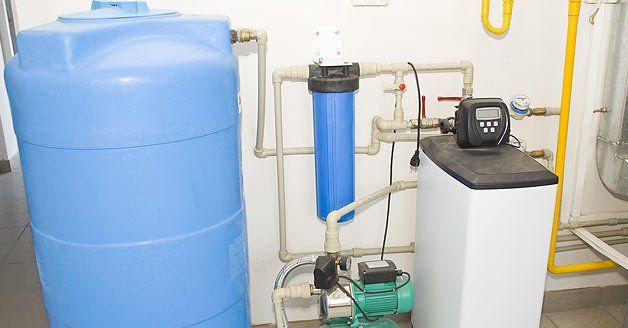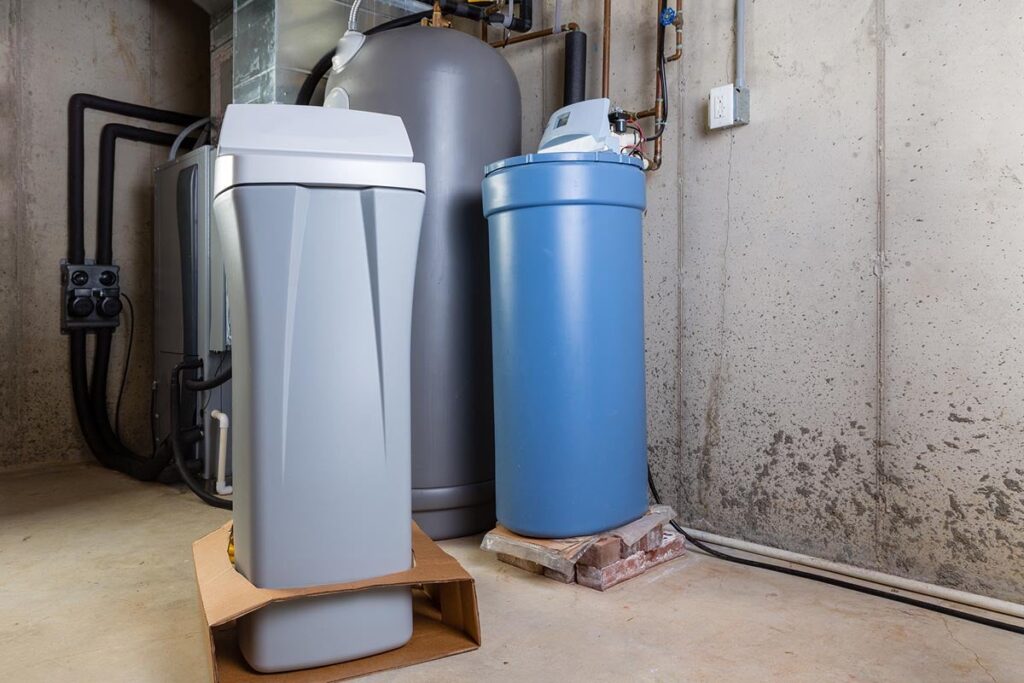Are you curious as to how septic systems work? Is your water softener instructions unclear or confusing? Do you want to know if a water softener is compatible with your septic system and home plumbing system?
Water softeners are important for many reasons like showering, laundry, dishwashing after cooking or even drinking it from your tap rather than purchasing bottled water all the time.
But when you use one with a septic system there’s always concern about compatibility and troubleshooting required in case of an issue – this article will cover everything you need to know about this topic
- Can You Use A Water Softener With A Septic System?
- Why a water softener can help a septic system function better.
- What are the effects of water softeners on septic systems? How Water Softeners Impact Septic Systems
- How to reduce the impact of a water softener on the Septic System and on Groundwater
- 1. You should ditch your old water softeners and Install Modern Water Softeners
- 2. Substitute Sodium Chloride with Potassium Chloride
- 3. Always Set your System's Regeneration Based on Water Flow
- 4. Only Treat the Necessary Water
- 5. Get a Bigger Septic Tank
- 6. Avoid Soil Containing High Clay Content
- 7. Reroute the Backwash Away from the Septic System
- Conclusion: Should I Use a Water Softener When I Have a Septic System?
Can You Use A Water Softener With A Septic System?
Yes, you can use a water softener with a septic system. Contrary to popular belief, the myth that sodium in softened water will reduce the effectiveness of bacteria is just that – a myth.
In fact, studies conducted by the University of Wisconsin have found that soft water can increase bacterial growth. This means that using a water softener with a septic system is not only safe but may also be beneficial in terms of keeping the septic tank functioning optimally.
People are worried that using a water softener will overload the septic tank with wastewater and cause problems. However, this isn’t the case. A study by Water Quality Research Foundation reported no overflow from the regeneration process in water softener brine discharge or any other household appliance using water- even at high flow rates.
Why a water softener can help a septic system function better.
Water softeners remove impurities and minerals from tap water, which helps keep the water flowing through your septic system without causing blockages. This prevents problems such as backup sewage, foul odors, or even damage to your equipment.
What are the effects of water softeners on septic systems? How Water Softeners Impact Septic Systems
Poorly functioning water softeners can produce too much waste brine which can have an impact on septic systems according to water-rightgroup. In particular, older septic systems may not be able to handle the excess brine and this could cause problems with the system’s ability to treat wastewater properly. Additionally, when water softeners regenerate, they can also produce a lot of waste brine which could have an effect on older septic systems.
Too much salt or water can overload the system and cause it to fail. It is important to consult with a professional before installing a water softener to ensure that it will not have any negative impacts on your septic system.
Regenerated backwash and softened water increase the sodium chloride levels in the septic tanks.
The regeneration backwash and softened water increase the sodium chloride levels in the septic tanks. This can lead to an increase in toxicity for the organisms that live in septic systems, as well as an increased risk of system failure.
Water softeners remove hardness from water, which can affect the way that it interacts with septic systems. By regenerating backwash and softening water, water softeners help to increase the amount of sodium chloride in the system.
This higher level of salt can cause problems for both the organisms that live in septic tanks and the overall integrity of a system’s plumbing.
Increased salinity in the septic tank messes up the pH levels and this may kill the helpful bacteria in the tank
Water softeners remove hardness and minerals from water, which can increase the salinity of the water in a septic tank. This increase in salinity can mess with the pH levels and kill helpful bacteria that help break down waste. As a result, water softeners can have negative impacts on septic systems.
If your septic system relies on the help of helpful bacteria to break down waste, an increase in salinity will disrupt this process. Salinity also increases the likelihood of harmful organisms taking hold and causing problems for your tank and system as a whole. In extreme cases, an over-softened water supply may even cause damage to components inside your septic system.
Fortunately, there are ways to mitigate these risks while still enjoying the benefits of using a water softener. By keeping track of how much salt is being added to your tank and adjusting it as needed, you can keep everything running smoothly without risking damage to your system or equipment.

How to reduce the impact of a water softener on the Septic System and on Groundwater
There is a potential conflict between water softeners and septic systems. A water softener can reduce the amount of hard water in the home, which can decrease the effectiveness of septic systems. In addition, a water softener can also increase demand for groundwater, which could deplete local resources.
If you’re using a water softener with your septic system, you may want to consider taking some precautions to minimize the potential conflict. You can try to adjust your usage habits or install an effluent filter to help reduce the impact of the softened water on your Septic System and groundwater.
You should also consult with an expert if you have any questions about how these devices might affect each other. They may be able to provide advice on how best to manage this potential conflict.”
1. You should ditch your old water softeners and Install Modern Water Softeners
Ditching your old water softeners and installing a modern water softener can reduce the impact of the water softener on the septic system and groundwater.
By switching to a modern water softener, you can avoid these problems. Modern water softeners use fewer chemicals than older models, which means they are safer for both you and the environment. They also have more efficient filtration systems, so they will not require as much maintenance over time.
2. Substitute Sodium Chloride with Potassium Chloride
Potassium chloride (KCl) is a salt that can be used to replace sodium chloride (NaCl) in water softener systems. KCl is less corrosive than NaCl, and it does not cause scale build-up in the softener.
When you install a new water softener, you may want to consider replacing the sodium chloride with potassium chloride. This change will help to reduce the impact of the water softener on your septic system and groundwater supply.
3. Always Set your System’s Regeneration Based on Water Flow
Setting your system’s regeneration based on water flow helps to reduce the impact of a water softener on the Septic System and on groundwater.
Water softeners remove hardness from water by breaking down the minerals that make it hard. When these minerals are removed, they leave behind salt and other chemicals. These chemicals can harm the septic system and groundwater if they’re not properly disposed of.
By setting your system’s regeneration based on water flow, you can help ensure that these harmful chemicals are eliminated before they have a chance to reach either of those sources.
4. Only Treat the Necessary Water
Don’t treat water that doesn’t need to be treated. Water softeners remove hardness from water and can cause problems for the septic system and groundwater. If you don’t need to treat the water, don’t do it – it will just waste resources and money.
If you do need to treat the water, use a filter or a reverse osmosis system. These methods are more effective at removing impurities than softeners, so they won’t have as much of an impact on the environment.
If you’re not sure whether or not to treat the water, consult your local experts – they’ll be able to tell you which treatment method is best for your situation.
5. Get a Bigger Septic Tank
A bigger septic tank can help reduce the impact of a water softener on the Septic System and on Groundwater.
The main benefit of getting a bigger septic tank is that it will be able to handle larger amounts of waste. This means that less water will need to be used to process the waste, which in turn reduces the amount of wastewater that goes into our waterways.
Additionally, a bigger septic tank will allow you to store more waste before it needs to be processed, which also reduces the amount of wastewater released into our waterways.
6. Avoid Soil Containing High Clay Content
Soil with high clay content can reduce the effectiveness of a water softener because it can clog up the system. This can cause sewage to overflow and contaminate groundwater.
To avoid this problem, you should test your soil before installing a water softener to make sure it doesn’t contain too much clay content. If it does, you may need to replace the soil before installing a water softener or find another way to improve its efficiency.
7. Reroute the Backwash Away from the Septic System
There are a few ways to reduce the impact of a water softener on the Septic System and on Groundwater. One way is to reroute the backwash away from the system. This will prevent solids from entering the drainage system and causing problems.
Conclusion: Should I Use a Water Softener When I Have a Septic System?
Yes, using a water softener is a good way to protect your septic system. The research done by the Water Quality Association in the 1970s found that water softeners do not have a negative impact on septic systems when used properly.
Also Read:
Mike Spencer
Hi Guys, Mike is a Mechanical Engineer who specializes in Heating, Ventilation, and Air-conditioning. His love for humanity and his profession propels him to share useful and factual Information on this blog.
